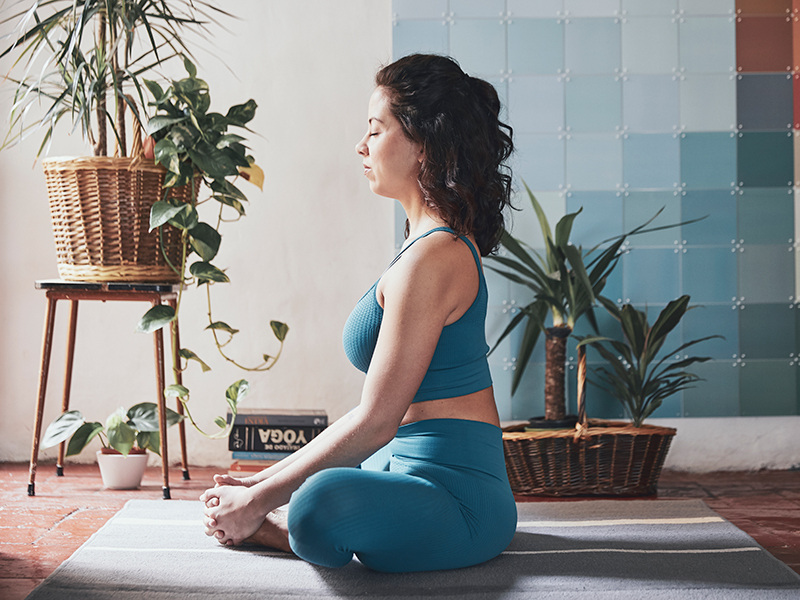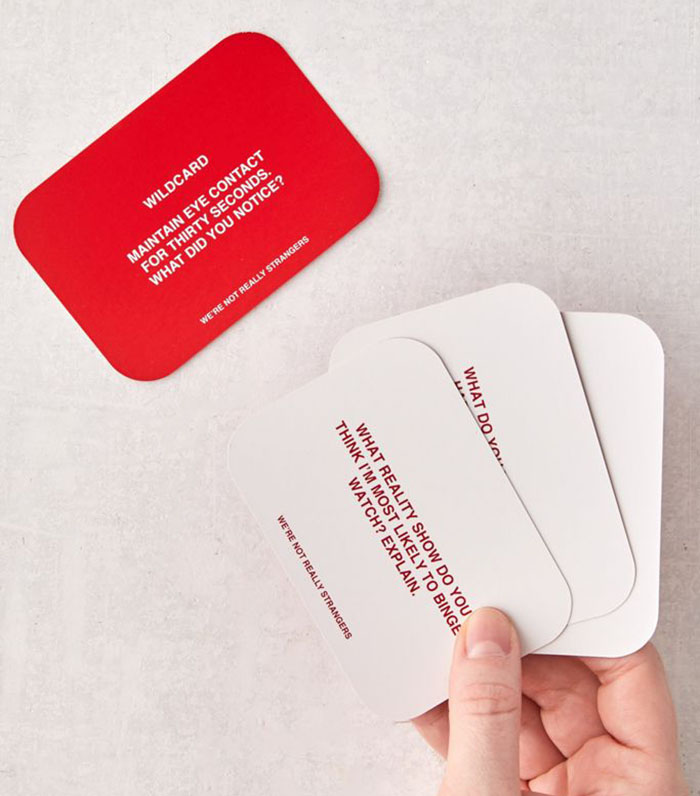25 Strategies for Finding Joy Even When It's Hard, According to Therapists

It's not an overgeneralization to say that this year has been challenging, scary, weird, devastating, confusing… Fill in the blank here. We've all experienced different challenges—losing loved ones, getting laid off from jobs, seeing the end of relationships, having to move or upend your life, facing depression or anxiety, and dealing with very personal problems and issues. In short, no matter what you've gone through during this time, it's probably been tough and a struggle.
All of these bad things can add up and take a toll on our mental health and overall well-being. It can be so hard to find joy, feel optimistic, or even look forward to the future when everything seems to be going wrong.
"It's easy for us to feel consumed by the powerful negative thoughts and emotions in our lives," explains Sage Grazer, LCSW, co-founder and chief clinical officer of Frame, a new mental health platform providing free resources and therapist-matching technology. "We're wired for survival, and that often includes a hyper-awareness of things that are painful, uncomfortable, or distressing. This is intended to serve as a way to protect us and be vigilant for those potential threats to our survival, but it also leaves us in a state of rumination on pain and distress."

All hope doesn't have to be lost, though. But you have to be willing and ready to put in the work to find that happiness and joy in order to take care of yourself and your mind. "Decades of research has demonstrated that general psychological well-being results from an active and intentional tending to experiences that cultivate happiness and fulfillment rather than something that just happens. Happiness also has a direct and positive impact on our immune functioning and can be protective against a host of physical as well as psychological illnesses," says Norman H. Kim, Ph.D., an international speaker, educator, advocate specializing in minority mental health, and the deputy director of Ayana, an app that matches BIPOC, queer, and intersectional communities with experienced therapists.
But working toward happiness doesn't happen overnight, and it's not exactly about willing your brain to completely forget about your past trauma, bad experiences, or the things that are going wrong in your life at that moment. One step in the process is allowing yourself to feel those feelings and being kind to yourself throughout.
"I believe we should first allow ourselves grace while understanding the grief that comes along with living in the midst of a pandemic," says Brittney R. Cobb, MSW, LCSW, founder of Be Well Mental Health Consulting Services. "Grief is associated with loss. We have lost the ability to physically connect; some have lost employment, loved ones. Taking a moment to acknowledge this is important. There is also a great deal of pressure to be productive with 'free time.' It's okay if you aren't. It's okay to rest and take it one day at a time."

The pessimist in us might wonder what's the point in doing all of this personal work if you feel that things don't seem to be getting better. I know that for myself, I've definitely had those thoughts, especially when it seems like there's no end in sight with this pandemic. But as cheesy as it sounds, hope and optimism can be armor for you. "Hope is a powerful feeling that leads to resilience in the face of adversity. And on the flip side, hopelessness is a hallmark sign of depression," says Grazer. Hearing that made me change my tune.
So for those of us who do want work toward finding even just the tiny bit of joy in our everyday lives, I asked a bunch of experts for some tips. See their strategies below.
1. Reframe Your Thoughts

Jordan A. Madison, LCMFT, creator of Therapy Is My J.A.M., says the best way to reframe your thinking is to focus on what has gone well so far. "The pandemic has caused a lot of uncertainty and turmoil," she explains. "However, it has also opened up different ways for us to connect with each other and become innovative in other areas. If you still have a job, are able to work from home, still have good health, don't know anyone who has been impacted by COVID, or know someone who had COVID and survived, those are all blessings within themselves. At this point, the pandemic has been going on for the past five months. If you're sitting down, reading this to relax, odds are you are doing better than you think you are."
2. Identify Things You Can and Can't Change

Some things are just out of our hands, but wanting to control these things can make you feel worse. "When we are experiencing stress, such as in our current collective state of fear and grief, it is especially important to identify those things we can do that are within our control and let go of those things that are not," Kim says.
3. Be Present

Yes, even when your present doesn't seem that great. "One of the most powerful things about this pandemic is that it's forced so many of us to focus on the present moment," explains Marah Lidey, co-founder of the self-care and mental health app Shine. "Yes, it's harder to make plans. But pre-pandemic, how often did we say to ourselves, 'When that thing happens next month, then I’ll be happy'? As someone who lost a family member to COVID-19 very early on, this whole experience has taught me to appreciate what I have right now and to be present with myself and the people I love." When you stay present and really focus on those small joys, you're able to build your resilience.
4. Use This Reframing Technique

"A quick reframe technique is to add the word 'yet' to the end of negative thoughts that would otherwise end without any prospect for change, improvement, or growth," Grazer says. "For example, instead of saying 'I'm not making enough money at my job,' you can say 'I'm not making enough money at my job yet,' which gives you the sense that you have the opportunity to improve that circumstance. Thoughts like, 'We don't have a way to treat/cure this virus,' may be true but don't leave you feeling optimistic. If you can reframe to say to yourself, 'We don’t have a way to treat/cure this virus yet,' you leave room for hope."
5. Give Yourself Time

Cobb says anxiety is a normal emotion, but you should take a moment when it begins to spiral and becomes overwhelming. "Awareness can help you do this. What triggers your thoughts to spiral? What does it feel like in your body? Paying attention to this helps you notice when it is happening," she says. "Then you can incorporate mindfulness. Take a few deep breaths. Ask yourself a series of questions, such as 'What out of all of this do I have control over?' 'The part I have control over, what can I do about it at this moment?' 'Is there anything I am grateful for right now?' 'What am I happy about at this moment?' Challenge yourself to really think about answers to the questions. After coming up with your answers, you've already started to reframe your thinking. This can help change your perspective."
6. Make a List
Writing down the positives can help. "Keep a daily list going of all the things you did well or enjoyed throughout the day," recommends Nina Vasan, MD, MBA, clinical assistant professor of psychiatry at Stanford University School of Medicine and chief medical officer of Real, a new on-demand therapy platform. "It is easier to see and remember the negative, so this intentional effort around the good can help ground you in a more positive mindset."
7. Get Moving
"Physical activities like yoga or taking a walk, even if it's just for a short period of time, can improve your mood especially if you do it with the mindset that you are doing something kind for your body and doing something that reminds you how resilient your body can be rather than focusing on just pushing yourself or losing weight, which can often be self-punishing rather than uplifting," Kim says.
8. Be Intentional

When you do things with intention, that can bring more meaning into your life. "Being intentional about self-care is a good start," Cobb says. "Set your intention for the day as well. 'Today my intention is to…' and fill in the blank with something positive you wish to accomplish or fulfill. Make small promises to yourself each day, like 'Today I will wake up and have a healthy breakfast,' or 'Today I will wake up, shower, and put on my favorite outfit even if I don't leave the house.' Finding joy is about doing things that contribute to your happiness."
9. Change the Way You Start Your Day

After hearing Oprah Winfrey say in an episode of SuperSoul Sundays that the first thing she does when she wakes up is say thank you and take a few seconds to think about what she's grateful for, Shine co-founder Naomi Hirabayashi says it inspired her to challenge how she starts her day.
"Before adopting this exercise, the typical way I would wake up was from a place of scarcity—running through how tired I feel, thinking through my mental to-do list for the day, and ultimately, even before my feet hit the floor, I'd already feel behind," she explains. "Switching up my morning routine to be grounded in abundance has created more openness in how I approach the day."
10. Make Time for Things You Like to Do
"Clear time for something you are passionate about. Block 10 minutes each day to engage in an activity that brings you joy," Vasan suggests. "This might be something you've been meaning to get back into or use this time to explore a new hobby. Identify a time in the day where you notice yourself feeling a bit down or more stressed, and then this can be a helpful and simple way to feel better quickly."
11. Journal
Journaling is always so therapeutic and helpful. "Dedicate a specific time during your day, even if it's just five or 10 minutes, to journal or meditate on one thing that you accomplished or one thing you did that made you feel good," Kim recommends. "When we are in times of stress, we tend to overly focus on the negative, so having a dedicated time to think about something positive can help reconnect you to positivity and hope."
12. Filter Out Negative Thoughts

You can't completely get rid of negative thoughts, but you can work to diminish them. "When clients struggle with intrusive negative thoughts, one technique that I will offer them is a cognitive exercise that requires your prefrontal cortex to be active and will direct your attention while also bringing positivity," Grazer explains. "The exercise is that every time you catch yourself with a negative thought or rumination, you have to list three to five things that you are grateful for, but the catch is that every time you have to come up with new things. This requires you to put more thought into identifying things in your life that you are grateful for that you may not be noticing on a daily basis."
13. Practice Affirmations

"Affirmations are also a good way to reframe your thoughts," Cobb says. "Shifting the thought from 'Things are crazy right now. They'll never be okay again,' to 'I've gotten through tough times before. I believe in my ability to get through tough times now,' can change your perspective. A healthy affirmation has a balance of both optimism and realism."
14. Bring Fun Into Your Home
It doesn't have to be all serious, and you can still have fun even if you can't travel or move about freely. "I've been telling my clients to bring the fun to the house. Just because we are spending more time at home, it doesn't mean that we have to do the same things over and over again," Madison says. "For example, on Mother's Day, I ordered some canvases and paint from Michaels. And we had a sip-and-paint and brunch in the house. I see plenty of families that have scheduled Zoom or FaceTime dates so that they are still able to connect with each other."
15. Introduce Radical Acceptance

"Work on adopting an attitude of radical acceptance, meaning we accept the reality of what's happening and those things that are out of our control, and in doing so, we focus our energies on those elements that we might be able to change, such as our own behaviors during this time of crisis," Kim says.
16. Identify the Good Things

Recalling certain good moments can take you to a better place or put you in a better mindset. "There's a therapeutic skill called resourcing, which is identifying things in your life that are uplifting, calming, or enjoyable as a way to connect to internal sensations of well-being that are pleasant or neutral. Finding what we call positive resources, which can be a memory or thought of a person, place, thing, or activity that brings feelings of positivity or neutrality," explains Grazer. "When people are in high levels of distress, sometimes it can be too challenging to identify something positive. This is when looking to something neutral can be relieving. One way to phrase this is, 'Can you think of one thing that doesn't hurt/feel bad?'"
17. Change Up Your Routine
Because our travel plans and activities are very limited right now, every day can feel so mundane, boring, and, at times, depressing. This is where changing your routine can help. "Take some breaks from your desk or your computer. Go for a walk, talk to family and friends, try cooking something new for dinner, start a new TV show," Madison suggests. "There are still plenty of ways to switch up your routine. Have something to look forward to by planning a road trip or having a socially distant outing with some friends."
18. Express Gratitude
Practice gratitude. You can do this by keeping a gratitude journal or letting people know you're grateful for them. Grazer adds that she has encouraged her clients to write a gratitude letter to themselves to combat negative self-talk or self-deprecating thoughts.
"Gratitude is also about finding ways to give back," Cobb says. "Writing a short note to someone you're grateful for at work. Sending a quick, gratitude text to a loved one who has helped you during this season. Volunteering. There are many ways to practice gratitude."
19. Check in With Yourself

"Check in with yourself often and honestly. Most of us are used to our external schedules dictating when we eat, when we sleep, when we see friends and family," Kim says. "Switching to attending to our internal signals for these basic needs can be challenging and might require an intention to do so and to listen to ourselves."
20. Reach Out for Help

Kim recommends reaching out for help when you might want it, not just when you might need it. "One of the most courageous things we can do, especially in a time like this, is to recognize and honor our own vulnerability," he says. "We are conditioned to think about self-reliance as a virtue, but we are hardwired to be social, interdependent beings. Reaching out to others forges and strengthens our bonds with people."
21. Think About What You Do Have

Try for the glass-half-full approach. "There have been so many losses during this time. The best way to view your circumstances with a different set of eyes is to focus on what you do have," Madison says. "Even if it is just something simple, having your health during a pandemic is a big feat. Another way to shift your perspective is to create a mantra filling in the blanks: 'Just because I… doesn't mean I…' For example: 'Just because I am not able to see my friends often doesn't mean I am alone.'"
22. Limit Your Social Media Time

"Spend less time on social media, more time maintaining connections with your loved ones and friends," Kim recommends. "Social media gives us a false sense of connection to the outside world, but what we see all too often is just what someone might wish to project rather than something that is reflective or reality. Especially when so many of us are physically isolated, we need to foster and maintain real connections more than we need virtual ones."
And a lot of us know how bad social media can make us feel when we see someone else's "perfect" life and compare it to our own. Taking a step back on social media can help us avoid these thoughts. "The saying goes, 'Comparison is the thief of joy,' and I find that to be extremely true," Madison says. "Social media culture has us comparing ourselves to what we see on our timelines. But we are only seeing others' highs and not their lows. Constantly comparing yourself to others or viewing life from a place of lack can deplete you from finding joy. If you are only thinking about what you don't have or what you can't do at the moment, then it can be hard to find joy in the moment."
23. Stay Connected to Your Community

"Find ways to stay connected to your communities: It is important for us to feel a part of something larger than ourselves," Kim says. "Whether it's an affinity community, a spiritual community, a work community, or an interest community, some connection to the larger world is essential for our psychological and spiritual well-being, even if it's virtual for now."
24. Look for Meaning in Challenging Situations

That saying "everything happens for a reason" is so true yet so infuriating at times, especially when you don't have the hindsight just yet. But keeping that idea in mind can help you cope. "When you find yourself feeling challenged or frustrated, pause, and identify a couple of good things that have come from said situation. Reframing helps keep you motivated and at peace," Vasan says.
25. Be Patient With Yourself

Now is not really the time to be hard on yourself or feel the pressure to do all the things at this time. "Something that's helped me switch things up, especially as we try to figure out a healthy balance with working 100% from home, is giving myself the space to listen to my needs and go with the flow of my energy," Lidey says. "It's important to remember that we're still working through a pandemic—on top of a well-past-due global movement for racial justice—and it's okay for us to just do the best we can for that day and not feel too pressured to always stick to one routine." So let yourself be productive on the days you feel that way, and allow yourself to veg during those times when you need to move slower.
Ultimately, it's all about paying attention to your needs and listening to yourself.
Next up: 15 People on the Things That Are Making Them Smile Right Now
This article is provided for informational purposes only and is not intended to be used in the place of advice of your physician or other medical professionals. You should always consult with your doctor or healthcare provider first with any health-related questions.
Sarah is lifestyle writer and editor with over 10 years of experience covering health and wellness, interior design, food, beauty, and tech. Born and raised in Los Angeles, she attended New York University and lived in New York for 12 years before returning to L.A. in 2019. In addition to her work atBest Knockoff Luxury Clothing , she held editor roles at Apartment Therapy, Real Simple, House Beautiful, Elle Decor, and The Bump (sister site of The Knot). She has a passion for health and wellness, but she especially loves writing about mental health. Her self-care routine consists of five things: a good workout, “me” time on the regular, an intriguing book/podcast/playlist to unwind after a long day, naps, and decorating her home.






